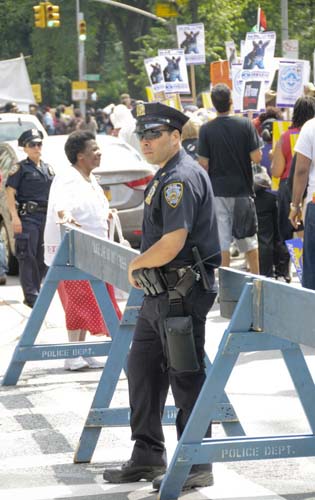The Simple answer is no. The police need to have "founded suspicion" in order to ask you if you are possessing any weapons in your car.
You have probably heard the saying “Knowledge is Power”. There is plenty of truth in the statement especially when you are talking about knowing the law. Every year we hear clients that regretfully tell us they didn’t know that they did not have to answer police questioning and how what they said hurt their case in court. When you know the law, you are better situated to think on your feet and react within your rights if you are being arrested or questioned by the police.
A Case That Brought About Change
In September of 2007 the police noticed that a driver, Miguel Garcia, was operating his vehicle with a defective brake light. The police pulled Mr. Garcia over and approached his vehicle observing that four other male passengers were in the car. The police informed Mr. Garcia about his defective light and at the same time noticed that the other passengers in the car were acting “nervous”.
The officers asked if anyone in the car was carrying a weapon and one passenger said he had a knife. At this point, the officers requested everyone to step out of the vehicle as they performed a full search of the car. The search resulted in the officers finding an air pistol and an air rifle in the trunk (air guns use compressed air to fire a bullet while regular firearms use a combustible propellant). So the issue for the courts to decide was balancing the rights of a driver’s privacy and protecting the safety of our police officers when they make routine traffic stops.
Does a Police Officer Have The Right To Ask A Driver If He Has Any Weapons In The Car?
The Police's Point Of View
The police are putting their life at risk anytime they pull a vehicle over on the side of the road. What may appear to be a routine traffic stop can sometimes escalate to a dangerous situation. During any traffic stop, an officer may have to arrest someone that is driving without insurance, driving drunk, committed a crime, carrying a firearm or illegal drugs.
A motorist that believes they are ‘caught’ one way or another may take drastic measures to avoid being taken into jail. This year in Queens, NY, Highway Patrolman Joseph Olivieri was shot dead when he was conducting a routine traffic stop. The driver was caught sometime later and was charged with the shooting and driving while intoxicated (DWI). Situations like this is why police officers often approach a vehicle cautiously while keeping a safe distance from the driver.
On The Other: Motorists
Under the Constitution everyone is guaranteed certain rights of privacy. Police searches and seizures fall under that right. The police officers that pulled over Miguel Garcia only felt that the passengers were acting nervous and decided to conduct a full search. Although the search did produce weapons, the passengers rights to privacy were put at risk when the police officers’ conducted a search based on a hunch.
What Did New York’s Highest Court Have To Say About The Issue?
In the lower courts, the lawyers for Garcia asked the court to suppress the gun evidence and dismiss the charges against the defendants. The Officers through the prosecutor appealed the decision to the appeal court. Judge Ciparick of the higher court agreed with the lower court stating that, “In light of the heightened dangers faced by investigating police officers during traffic stops, a police officer may, as a precautionary measure and without particularized suspicion direct the occupants of a lawfully stopped vehicle to step out of the car. Whether the individual questioned is a pedestrian or an occupant of a vehicle a police officer who asks a private citizen if he or she is in possession of a weapon must have founded suspicion that criminal activity is afoot.”
The judge noted that a citizen has certain rights to privacy under the 4th Amendment and that the police are allowed to take certain measures only after necessary levels of suspicion have been met. Police are allowed to ask basic non-threatening questions however when the questions are more direct and invades someone’s privacy or the questions make an individual feel accused of some crime or wrongdoing. Now, unless there is a founded suspicion to ask, the police can no longer ask a driver if they have a gun or other weapon in the car.
Rosenblum Law
If you or a loved one has been arrested for weapons possession and charged with a crime call our law firm today. Our attorneys will aggressively defend your matter and help protect your rights. Call now 1-888-883-5529.




